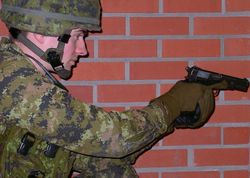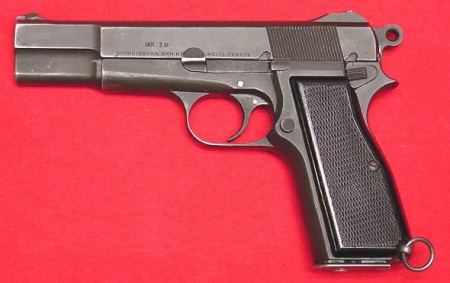9mm pistol: Difference between revisions
No edit summary |
No edit summary |
||
| Line 14: | Line 14: | ||
*'''Magazine:''' 13 rounds | *'''Magazine:''' 13 rounds | ||
[[Category: Small Arms]] | [[Category: Small Arms and Crew Served Weapons]] | ||
Latest revision as of 13:17, 1 September 2006
Browning 9-mm Pistol

The Browning Hi-Power is based on a semi-automatic 9mm pistol conceived and patented in the United States in 1922 by American John Browning, who eventually took his ideas to Belgium and the arms manufacturer Fabrique Nationale de Herstal. The design was fully developed and realized through the efforts of Belgian arms designer Dieudonne Saive working at FN. This pistol was noted for having the first functional double-column magazine of 9mm Parabellum rounds, capable of holding 13 cartridges, and allowing a 14th loaded in the chamber. (Modern "flush fit" magazines are now available which hold 15 cartridges allowing a 16th to be loaded in the chamber, and magazines which extend beyond the grip can hold considerably more.)
The Browning 9mm was made the standard sidearm of Canadian soldiers in late 1944, replacing the standard issue .38 revolver.
The Browning 9-mm pistol is carried by officers and soldiers who require a sidearm that can be rapidly drawn and fired, even in confined spaces. The pistol consists of a barrel, a slide, a breech block, a frame, and a 13 round magazine.
[[Image:

- Type: Single Action
- Chambering: 9mm Parabellum
- Length overall: 200 mm
- Barrel length: 118 mm
- Weight: 885 g
- Magazine: 13 rounds